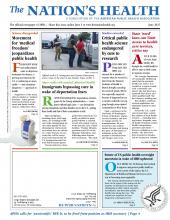
From trends in water safety to the impact of air pollution, data can help people understand and get on board with public health measures, a new APHA Press Book advises.
“Data-Informed Decisionmaking: Using Data to Build Consensus and Align Priorities,” released in spring, shows public health professionals how they can gather, interpret and present data in a way that can engage communities and improve public health.
The new volume, part of APHA’s Strategic Skills for Public Health Practice series, shows public health advocates how to find data sources and improve outcomes by including communities in the discussion.
“All of those things are important, rather than just looking at the data, looking at the numbers and taking them at face value,” according to co-author Chad Abresch, PhD, MEdm, chair and associate professor for the Department of Health Promotion at the University of Nebraska Medical Center.
Balancing quantitative and qualitative data is an important consideration, according to the new book. One example is the Healthy Start home visiting program, a federal initiative that works to improve the health of infants and mothers.
Qualitative data shows Healthy Start improves health outcomes in early childhood development, but the program’s lack of quantitative data has kept it off the federal list for reimbursement under the Affordable Care Act.
Knowing your intended audience can also help when presenting data. In a pitch to city council, emphasizing numbers or cost benefits could work, the authors said. If addressing a town hall, tilting toward data that involves people who have real-world experience involving an issue can translate into a successful strategy.
“It’s about understanding who you’re talking to and being strategic in your message,” Abresch told The Nation’s Health.
The book also discusses “positionality,” which acknowledges that an advocate’s background and past experiences can bias their data collection. Passionate advocates might skim over problems in their analyses because some of it contravenes the goal of improving community health. Skeptics might see this as a coverup and ramp up criticism on a plan that had merit.
“Not only do public health professionals need to understand and respect the positionality of community members, but their success depends upon being thoughtful and transparent about their own positionality,” said Abresch, one of five co-authors of the book affiliated with the University of Nebraska Medical Center.
Community decisionmaking is emphasized throughout the volume.
“We really think that impacted communities should have the primary voice in shaping what we do in public health,” Abresch said. “As public health individuals, we partner with community to share data, to inform the conversation and then collectively make the decision.”
With public health under attack by the federal government, having well-trained public health officials in communities and states who can take the lead in the absence of federal support is more critical than ever, Abresch said.
For more information or to purchase “Data-Informed Decisionmaking: Using Data to Build Consensus,” visit www.aphabookstore.org.
- Copyright The Nation’s Health, American Public Health Association









